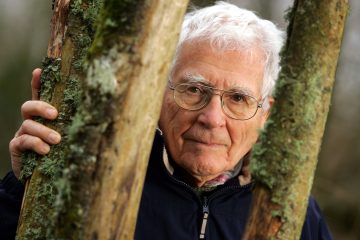In the realm of environmental activism and sustainable living, the name James Lovelock shines brightly as a pioneer whose work continues to inspire and ignite discussions worldwide. While Lovelock’s groundbreaking Gaia hypothesis has captured the imagination of many, an intriguing question lingers: What if this esteemed scientist were to embrace the vegan lifestyle? Delve into the intersection of science, ethics, and plant-based living as we explore the hypothetical scenario of James Lovelock going vegan, unraveling its potential impact on the planet and our collective future.
Table of Contents
- Understanding James Lovelock’s Views on Veganism
- Exploring the Environmental Impact of Veganism According to James Lovelock
- Key Arguments Supporting Veganism by James Lovelock
- Practical Steps to Embrace a Vegan Lifestyle as Recommended by James Lovelock
- Q&A
- Key Takeaways
Understanding James Lovelock’s Views on Veganism
James Lovelock, a prominent environmentalist known for his Gaia theory, holds intriguing views on veganism that spark thought-provoking discussions. According to Lovelock, adopting a vegan lifestyle is not only beneficial for personal health but also plays a crucial role in reducing environmental impact. By refraining from consuming animal products, individuals can contribute to mitigating climate change and preserving biodiversity.
Lovelock’s perspective on veganism emphasizes the interconnectedness between human actions and the health of the planet. He highlights how transitioning to a plant-based diet can help lessen greenhouse gas emissions, conserve water resources, and combat deforestation. Through embracing veganism, Lovelock suggests that we can take significant steps towards fostering sustainability and safeguarding the Earth’s delicate ecosystems for future generations. In his vision, veganism serves as a powerful tool for promoting both individual well-being and global environmental harmony.
Exploring the Environmental Impact of Veganism According to James Lovelock
In a world increasingly conscious of its environmental footprint, the nexus between diet choices and sustainability has garnered significant attention. James Lovelock, renowned for the Gaia hypothesis, delves into the environmental implications of embracing veganism. According to Lovelock’s research, adopting a vegan lifestyle can play a pivotal role in reducing greenhouse gas emissions and preserving biodiversity.
Moreover, Lovelock emphasizes the substantial water savings associated with plant-based diets, highlighting the strain that animal agriculture places on freshwater resources. By opting for vegan alternatives, individuals can contribute to water conservation efforts while also promoting ethical and ecological practices. Embracing veganism, as advocated by Lovelock, presents a compelling opportunity to align personal dietary preferences with broader environmental stewardship goals.
Key Arguments Supporting Veganism by James Lovelock
James Lovelock, a prominent advocate of veganism, presents compelling arguments that resonate with both environmentalists and health-conscious individuals. One key argument centers around the environmental impact of animal agriculture. Lovelock highlights how the mass production of livestock contributes significantly to greenhouse gas emissions, deforestation, and water pollution.
Furthermore, Lovelock emphasizes the ethicality of adopting a vegan lifestyle by addressing the inhumane treatment of animals in industrial farming. By choosing a plant-based diet, individuals can actively support animal welfare and promote a more compassionate approach to food consumption. This shift not only benefits the animals but also aligns with principles of sustainability and respect for all living beings.

Practical Steps to Embrace a Vegan Lifestyle as Recommended by James Lovelock
Looking to make a positive change in your lifestyle by embracing veganism? James Lovelock, renowned for his environmental advocacy, offers practical steps to help you transition smoothly into a vegan way of living.
<p>Firstly, focus on incorporating more plant-based foods into your diet. Explore a variety of fruits, vegetables, legumes, nuts, and whole grains to ensure you're getting a balanced mix of nutrients while supporting sustainable agriculture practices.</p>Q&A
**Q&A: Exploring James Lovelock’s Views on Veganism**
Q: Who is James Lovelock?
A: James Lovelock is an esteemed British scientist, best known for proposing the Gaia hypothesis, which suggests that the Earth functions as a self-regulating system.
Q: Is James Lovelock a vegan?
A: While James Lovelock is not a strict vegan, he has expressed his support for plant-based diets and sustainable food choices.
Q: What are James Lovelock’s views on veganism?
A: Lovelock believes that shifting towards plant-based diets can have positive environmental impacts, reducing greenhouse gas emissions and promoting biodiversity.
Q: How does James Lovelock’s perspective on veganism align with his Gaia hypothesis?
A: Lovelock’s advocacy for veganism resonates with the Gaia hypothesis as it emphasizes the interconnectedness of all living organisms and the Earth’s ecosystems.
Q: How can individuals incorporate Lovelock’s ideas on veganism into their daily lives?
A: By choosing plant-based meals, supporting sustainable agriculture, and reducing meat consumption, individuals can contribute to a healthier planet in alignment with Lovelock’s principles.
Q: What role does veganism play in addressing climate change, according to James Lovelock?
A: Lovelock sees veganism as a key strategy in combating climate change, citing the environmental benefits of reducing reliance on animal agriculture.
Q: In what ways has James Lovelock influenced the discourse on veganism and environmental sustainability?
A: James Lovelock’s insights have sparked meaningful conversations about the intersection of diet, ecology, and climate change, inspiring individuals to consider the environmental impact of their food choices.
Key Takeaways
As the debate around James Lovelock’s stance on veganism continues to spark curiosity and conversation, one thing remains clear: his unique perspectives challenge us to think critically about our relationship with the environment and the food we consume. Whether you align with his views or not, exploring the intersection of science, ethics, and sustainability through Lovelock’s lens opens doors to fascinating discussions and reflections. Remember, the beauty of intellectual discourse lies in its ability to broaden our horizons and shape our understanding of the world around us. So, let’s keep questioning, learning, and evolving together. Embrace the journey of discovery, for knowledge knows no bounds.


0 Comments